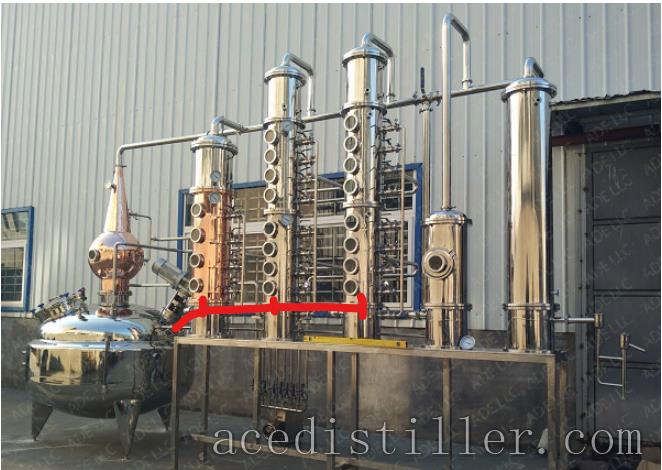-
Can the title be rewritten to pose a question instead?
Posted by birster on June 25, 2020 at 2:31 pmHi,
In a setup similar to this one, where you have 3 columns side by side, should each column has a it’s own dedicated return line to the pot? Or they can all share the same return line?

Thanks,
birster replied 4 years, 5 months ago 7 Members · 10 Replies -
10 Replies
-
for cleaning, single common line is fine. but if you intend on running the system with all columns, it wont work at all. Liquid will build up on the plates and will not drain back at all.
you need a pump at the bottom of each column, to push the distillate back up to the top of the previous column
-
It is very common for them to share a common return line. However, it is important that vapor cannot travel from one column to another via this line. This seal can be made by using a U bend or a P-trap (but not an S trap). The return line must also not cause a siphon which would pull all the liquid from the return line. The siphon is usually prevented by making sure that the return line is big enough to never run full and by drilling a small (approx 3 mm) hole in the return line inside the pot above the bulk liquid level.
-
ViolentBlue and I were replying at the same time so I did not see his reply before I hit “submit”. It is true that for optimum energy efficiency the bottoms from a column should be pumped as reflux to the top of the previous column. It is always done this way in large commercial distilleries. However, it is common in craft distilleries to drain the bottoms from each column directly back to the pot and each column generates its own reflux by using a deflegmator built into the top of the column. This works just fine, and maybe even adds a bit of flexibility, even if it is a bit less energy efficient.
-
OK perfect, thank you guys for your replies. It comfort our initial thoughts. We will ask our manufacturer to proceed with three distinct lines return to the pot. Each line will have a dip low enough inside the pot to make sure they are always submerged. Our still is only 500L and will have 1 dephlegmator on each of the 3 column. I think it would be overkill with the pump setup on each column, this is good to know though.
edit: re-reading your comment Meerkat, should I make sur they drill a hole of 3mm on each of the return line inside the pot as you suggested in your first reply? Or it is not necessary when you have 3 distinct lines?
Thank you!
-
If your mfg doesn’t know all this stuff already, you are probably in for a nightmare to get a 3 column system to perform adequately.
-
@Birster If each column has its own drain line with the discharge end below the liquid surface in the pot then the siphon-break holes are not required. This arrangement will prevent vapor traveling between the column bases and the U-bend seals are therefore also not required. Without the U-bend seals there is nothing to siphon out. Doing away with the seals also makes the piping easier to flush and drain. The extra expense of the separate lines does make for a nicer system.
-
Birster,
That is one of my stills. It has 3 pumps to pump the column condensate (not shown in the pic). Without the pumps you would never reach 190 proof. I build these stills for customers who have lower height restrictions. Also we use thermostatic valves on these stills to control the coolant flow to the final condenser and dephlegmators.
-
What pumps do you typically recommend for this type of set up?
-
Yes I took the screenshot from your website. Thank you for clarifying how the system actually work. That is interesting, we might want to go with only a 16 plates column instead. We will see in the future anyway. As for now we ordered only a 4 plates. It was for future expension I was asking. Thank you too @meerkat for the added infos.
Log in to reply.
